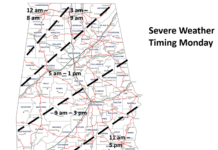
Health care workers and first responders are stepping up in the fight against COVID-19. Certified Registered Nurse Anesthetists (CRNAs) are a group of Advance Practice Registered Nurses (APRNs) on the frontlines that are placing themselves in the most dangerous position of exposure during an intubation or placement of a breathing tube.
COVID-19 is known to produce hypoxemia and respiratory distress which may lead to the need for additional breathing support requiring this procedure. Intubation requires administering sedating medications, similar to what would be administered in surgery, so that a breathing tube can be gently placed under direct visualization into the trachea or windpipe. This procedure can lead to aerosolization of the virus particularly to those in close proximity.
In a known COVID-19 positive patient, a CRNA will don appropriate personal protective equipment (PPE) so that he/she is protected in the best way possible. However, until testing is provided for every patient entering the hospital, many are considered a person under investigation (PUI) or possibly an asymptomatic carrier. Therefore, it is important that the CRNA protect himself or herself on every intubation.
Many hospitals are seeking donations of appropriate PPE due to extreme limitations in their inventories. When caring for these COVID-19 positive patients the required amount of PPE donning and doffing leads to depletion of normal stock very quickly. Community support has been tremendous and appreciated.
Many institutions are forming special airway response teams (COVID teams) using CRNAs because the most experienced airway expert should place the breathing tube. These CRNAs start their 12-hour shift not knowing when a call will come or what particular situation they will respond to. Utilizing their background in critical care nursing and required ability to think autonomously during critical events helps them to know what to do as they respond. In our rural Alabama hospitals, the CRNA is one of the few advanced healthcare providers taking care of patients as they enter the hospital.
Hospitals are given great latitude during this crisis in Alabama due to Governor Kay Ivey’s Proclamation on April 2, 2020. This allows APRNs to practice to their full scope of practice, education, training, and national certification. Emergency operation plans are helping hospitals utilize their workforce to maximum potential so that Alabama lives can be saved.
During this uncertain time of the COVID-19 pandemic, know that the 1,800+ CRNAs in Alabama are providing Safe and Effective Care for Every Patient, Every Breath, Every Beat, Every Second.
For more information visit www.alabamacrna.org.




















